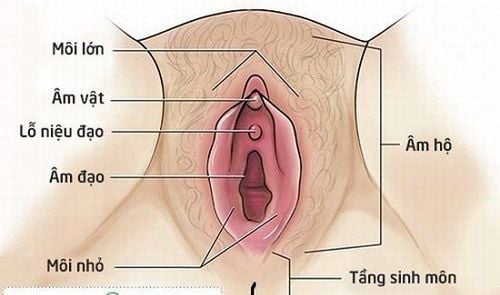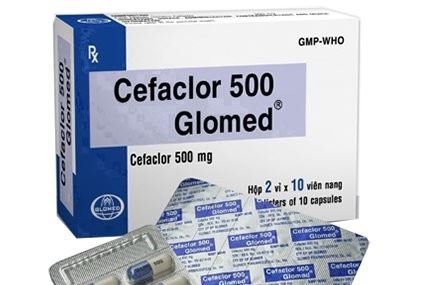This is an automatically translated article.
Akudinir is used to treat infections caused by bacteria sensitive to Cefdinir. On the market today, there is a lot of information about Akudinir drug products, but it is still incomplete. To better understand what is Akudinir? What are the uses of Akudinir? Find out more in the article below.
1. What is Akudinir 300mg, Akudinir 250mg and Akudinir 125mg?
Akudinir 300mg capsule contains the active ingredient Cefdinir, indicated in the treatment of infections caused by strains of bacteria susceptible to Cefdinir, upper and lower respiratory tract infections, folliculitis, boils, and boils. , impetigo, erysipelas, inflammation, vasculitis or lymphadenitis, periungitis, subcutaneous abscess and sweat gland inflammation, infectious atherosclerosis, chronic pyoderma, nephritis, cystitis nephritis, cystitis, endometritis, metritis and Bartholin's gland.Akudinir 125mg and Akudinir 250mg are made in powder form for oral suspension, packed in 30ml bottles, indicated for the treatment of community-acquired pneumonia, chronic bronchitis, severe sinusitis, pharyngitis/tonsillitis, dermatitis and soft tissue...
2. Drug interactions
Antacids (containing aluminum or magnesium) combined oral administration of 300 mg of Cefdinir per 30 ml of suspension containing aluminum reduces the ratio of Cmax and AUC of absorption. Akudinir 125mg and Akudinir 250mg containing iron should be taken 2 hours apart.
Concomitant use with iron-containing drugs or antacids reduces the absorption of Cefdinir. Therefore, if co-administration of Cefdinir is necessary, it should be taken 2 hours before or after the above drugs. Probenecid also reduces the renal excretion of cefdinir.
3. What does Akudinir do?
Drugs Akudinir 300mg, Akudinir 250mg and Akudinir 125mg are indicated for use in cases of upper and lower respiratory tract infections. Folliculitis, boils, impetigo, worms, chronic pyoderma. Pyelonephritis, cystitis. Uterine adnexitis, metritis and Bartholin's gland inflammation, etc. Specifically:
Adults and adolescents:
Community-acquired pneumonia caused by strains of Haemophilus influenzae, Haemophilus parainfluenzae, Streptococcus pneumoniae, Moraxella catarrhalis. Severe chronic bronchitis caused by strains of Haemophilus influenzae, Haemophilus parainfluenzae, Streptococcus pneumoniae and Moraxella catarrhalis. Severe sinusitis caused by strains of Haemophilus influenzae, Streptococcus pneumoniae and Moraxella catarrhalis. Pharyngitis or tonsillitis caused by a strain of Streptococcus pyogenes. Skin and soft tissue inflammation caused by strains of Staphylococcus aureus and Streptococcus pyogenes. Pediatric patients:
Severe otitis media caused by strains of Haemophilus influenzae, Streptococcus pneumoniae and Moraxella catarrhalis. Uncomplicated skin and soft tissue inflammation caused by strains of Staphylococcus aureus and Streptococcus pyogenes. Akudinir 300 mg is indicated for use in cases of infections caused by strains of bacteria susceptible to cefdinir such as: Staphylococcus sp., Streptococcus sp., Streptococcus pneumoniae and Peptostreptococcus sp., Propionibacterium sp., Neisseria gonorrhoeae, Branhamella catarrhalis, Escherichia coli, Klebsiella sp., Proteus mirabilis, Providencia sp., and Haemophilus influenzae include the following:
Upper respiratory tract infections and lower respiratory infections. Folliculitis, boils, impetigo, erysipelas, erysipelas, vasculitis or lymphadenitis, peritonitis, subcutaneous abscess, sweat gland inflammation, infectious atheroma and pyoderma chronic. Nephritis, pyelonephritis and cystitis Adnexitis, metritis and Bartholin's gland inflammation.
4. Contraindication of drugs Akudinir 300 mg, Akudinir 250 mg and bidilucil 125 mg
Absolutely do not use Akudinir-300 for patients who are allergic to cephalosporins. The drug should not be used in patients with a history of allergy to penicillin because of possible cross-allergic reactions. Akudinir 125 and 250 are contraindicated in the following cases: Hypersensitivity to cefdinir or to any of its ingredients.
5. Side effects of drugs Akudinir 300 mg, Akudinir 250 mg and bidilucil 125 mg
Some side effects may be encountered when using Akudinir-300 such as:
Headache, dizziness may be experienced when you use the drug. Allergic reactions with symptoms, such as skin rash, pruritus, urticaria, etc., may be more severe with anaphylaxis, Quincke's edema or Stevens - Johnson syndrome. Akudinir-300 may also be nephrotoxic causing interstitial nephritis. Digestive disorders can also be encountered when taking the drug with symptoms such as nausea, vomiting, abdominal pain, diarrhea,... Long-term use of Akudinir-300 can cause fungal infections in the mouth or vagina.
In addition, some major cases of neutropenia, eosinophilia, and thrombocytopenia were reported when using Akudinir-300.
Side effects of Akudinir 125 and 250 may be encountered: diarrhea, nausea, headache, abdominal pain, rash,... Inform your doctor about unwanted side effects encountered while using drug use.
Rarely: nausea, vomiting, abdominal pain, upset stomach, anorexia, constipation; headache, dizziness, feeling of heaviness in the chest; stomatitis, fungal infections; lack of vitamin K, vitamins of group B; leukopenia, increased liver enzymes and increased BUN. Very rare: hypersensitivity, enteritis and interstitial pneumonia.
6. How to use Akudinir 300 mg, Akudinir 250 mg and bidilucil 125 mg effectively
6.1. How to use Akudinir 300 mg The best time to take Akudinir 300 mg is after a meal, you should drink it with 200ml of water.
However, if you are taking an antacid or your meal contains iron-rich foods, take them at least 2 hours apart.
You need to make sure how to use, dose, and time to take the medicine as directed by your doctor to get the most effective treatment
6.2. How to take Akudinir 250 mg and bidilucil 125 mg The drug should be taken immediately after meals and at least 2 hours before or after taking antacids or iron-containing products.
Pour cooled boiled water into the bottle and shake well to dissolve the medicine. Make up to the mark with water (full 30 ml). The reconstituted suspension should be stored at room temperature and used within 10 days.
7. Dosage of drugs Akudinir 300 mg, Akudinir 250 mg and bidilucil 125 mg
7.1. Dosage of the drug Akudinir 250 mg and bidilucil 125 mg The total dose used for all infections is 600 mg / time / day and treatment for 10 days. There are no studies on the daily dose in people with pneumonia and skin diseases. Therefore, it should only be taken twice daily in these patients.
Suggested dose for adults and children over 13 years old
Community-acquired pneumonia: 300 mg every 12 hours and for 10 days. Severe chronic pneumonia includes: 300 mg every 12 hours or 600 mg every 24 hours, for 10 days. Sinusitis: 300 mg every 12 hours or 600 mg every 24 hours for 10 days. Pharyngitis or tonsillitis: 300 mg every 12 hours for 5 days or 600 mg every 24 hours for 10 days. Uncomplicated skin and soft tissue inflammation: 300mg every 12 hours for 10 days. Pediatric patients (ages 6 months to 12 years)
Severe otitis media: 7 mg/kg every 12 hours for 5 to 10 days or 14 mg/kg every 24 hours for 10 days. Severe sinusitis: 7 mg/kg every 12 hours for 5 days or 14 mg/kg every 24 hours for 10 days. Pharyngitis/tonsillitis: 7 mg/kg every 12 hours for 5 – 10 days or 14 mg/kg every 24 hours for 10 days. Uncomplicated dermatitis and skin structure: 7 mg/kg every 12 hours and for 10 days. Patients with renal failure
Adults: GFR < 30 ml/min/1.73 m2 and dose is 300mg/time/day. Pediatric patients: GFR < 30 ml/min/1.73 m2 and dose is 7 mg/kg/day/time (up to 300 mg). Patients on hemodialysis
Since hemodialysis removes cefdinir from your body, in chronic dialysis patients the initial dose is 300 mg and the maintenance dose is 7 mg/kg.
Note: The above dosage is for reference only. The specific dose will depend on the condition and the progression of the disease. To get the right dose, you need to consult your doctor or medical professional.
Overdosage:
Symptoms and signs of toxicity when using an overdose of known beta-lactam antibiotics such as: nausea, vomiting, epigastric pain, diarrhea, convulsions,...
Dialysis effective in cases of cefdinir overdose and especially in cases of impaired renal function.
7.2. Dosage of the drug Akudinir 300 mg For adults: should use 1 capsule Akudinir-300 daily divided into 3 times / day, 100mg each time and after breakfast, lunch and dinner.
For children, the dose will depend on the weight of the child.
Dosage is also calculated as: 9-18mg x kg of child's weight divided into 3 doses in 1 day after breakfast, lunch and dinner.
What to do in case of overdose?
In case of an emergency, immediately call 911 or go to the nearest local health station.
What to do when you miss a dose?
If you miss a dose, take it as soon as possible. However, when it is almost time for your next dose, skip the missed dose and take your next dose at the scheduled time. Note that double the dose prescribed should not be used.
8. Be careful when using Akudinir 300 mg, Akudinir 250 mg and bidilucil 125 mg
Extreme caution should be exercised when Akudinir-300 is administered to:
Patients with a personal or family history of allergies: Urticaria, rash, and bronchial asthma. Patients with severe renal failure. Patients receiving parenteral nutrition, elderly and debilitated patients. Pregnant. Care should be taken when administering Akudinir 250 mg and 125 mg
Prolonged treatment may lead to the development of resistant bacteria. Use with caution in patients with a history of colitis. In renal failure with creatinine clearance less than 30ml/min, the dose should be reduced. Use with caution in pregnant or lactating women. The safety and effectiveness of cefdinir in infants younger than 6 months of age have not been established. If an allergic reaction to cefdinir occurs, treatment should be discontinued and appropriate therapy instituted.
Pregnant women: Need to be careful when using, only use the drug when absolutely necessary.
Lactating women: Use with caution, consult your doctor before use.
Please dial HOTLINE for more information or register for an appointment HERE. Download MyVinmec app to make appointments faster and to manage your bookings easily.













